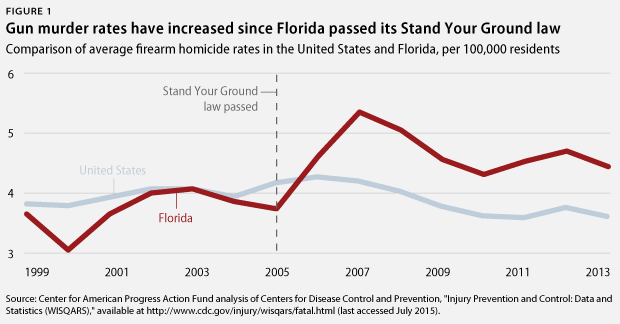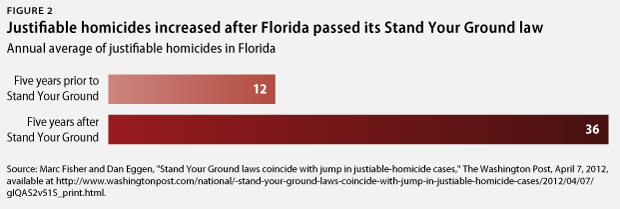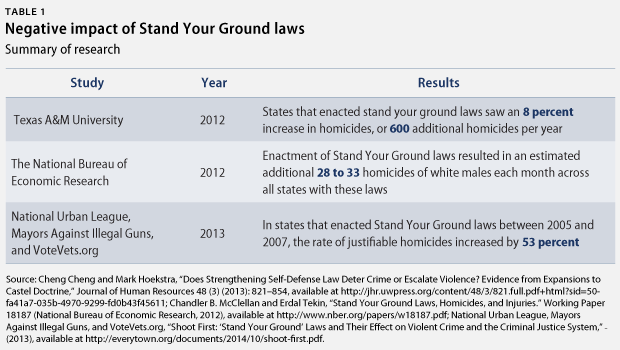On April 10, 2015, two months before formally announcing his candidacy for president, former Florida Gov. Jeb Bush (R) addressed a crowd of thousands at the National Rifle Association’s, or NRA’s, annual convention in Nashville, Tennessee. Gov. Bush was eager to recount his gun rights bona fides before this audience, proclaiming, “I will match my record against anyone else when it comes to support and defense of the Second Amendment.” During his remarks, Gov. Bush repeatedly stated that his administration’s actions on gun issues often served as a model for other states, including his signing of Florida’s so-called Stand Your Ground law in 2005—the law that dramatically expanded an individual’s right to use lethal force in self-defense. This law first rose to national attention following the 2012 shooting death of unarmed teenager Trayvon Martin in Florida by George Zimmerman, an overzealous neighborhood watch volunteer who instigated the altercation and was ultimately acquitted of all criminal charges stemming from the killing because of Florida’s recklessly broad laws of self-defense. Gov. Bush described “Stand Your Ground” as “a sensible law that other states have adopted.”
He is exactly right that Florida has served as the model for other states on this issue of redefining and significantly broadening an individual’s ability to use lethal force in self-defense. Following his administration’s enactment of the nation’s first Stand Your Ground law in 2005, nearly half of the states followed suit: As of February 2015, 24 states had enacted expansive self-defense laws. And while Gov. Bush touted this as a significant achievement at the NRA convention in April, the reality is that the legacy of his leadership on this issue has left a dark footprint on the country. It has led to an increase in homicides in states that have enacted these laws, as well as a racially skewed application that results in white perpetrators more frequently being relieved of liability for killing black victims.
This issue brief discusses Gov. Bush’s role in setting off this trend in state legislation, assesses the impact of Florida’s Stand Your Ground law in the state, and discusses the nationwide impact of these laws on public safety, as well as the disproportionate burden these laws place on communities of color. But despite public outcry against Stand Your Ground laws and some politicians’ calls to re-examine them, Gov. Bush still supports Florida’s dangerous precedent as a national model for self-defense laws.
An expansive new concept of self-defense in Florida
In 2005, the National Rifle Association decided that the traditional principals of selfdefense in the United States were too narrow to accommodate the full range of situations in which individuals may want to use deadly force. Under a body of law developed over hundreds of years through court decisions and codified in many states’ laws, individuals are entitled to use deadly force in self-defense only when they have no alternative to protect themselves and no opportunity to safely retreat from the danger. One common exception to this so-called duty to retreat before resorting to lethal force is when individuals face danger in their homes. In this circumstance—commonly referred to as the “castle doctrine”—an individual need not try to retreat within or from the home and may use deadly force to repel an attacker.
Led by NRA lobbyist and former President Marion Hammer, the NRA engaged in a campaign to enact a new law in Florida that would dramatically expand the castle doctrine exception to include situations in which people reasonably believe that they face death or serious injury while outside their home. Under this approach, individuals who believe they are facing a threat to their physical safety do not need to consider any alternatives to the use of deadly force, such as safe retreat from the encounter or a lesser, nonlethal response. In addition, this NRA-drafted legislation went even further and provided for complete immunity from prosecution for people who invoke this defense—meaning that they would not even face criminal charges—as well as immunity from civil lawsuits stemming from any use of lethal force against another person. The Stand Your Ground bill easily passed both houses of the Florida legislature, and Gov. Bush signed it into law on April 26, 2005.
Even as he was signing the new expansive self-defense bill, however, Gov. Bush was on notice of the likely negative impact this legislation could have on public safety in Florida. Then-Miami Police Chief John Timoney said the new law was a “License to Murder” and worried that it would “encourag[e] people to possibly use deadly physical force where it shouldn’t be used.” As discussed below, concerns about a potential increase in the use of lethal force in interpersonal disputes following the enactment of the law turned out to be well founded.
Impact of the Stand Your Ground law in Florida
Increase in gun homicides
Regardless of the original intent of this law, the negative impact on public safety in Florida from the expansion of self-defense laws quickly became apparent. In the two years following the enactment of the Stand Your Ground law, the number of gun-related homicides in Florida increased by more than 200 cases. Additionally, the gun homicide rate in Florida jumped above the national average after this law was enacted, where it has remained since 2005. This rise in Florida gun homicides came during a period when national gun homicide rates remained relatively flat.

One theory about the Stand Your Ground law’s impact on murder rates is that this type of broad self-defense law empowers or encourages individuals to use deadly force in situations where they may otherwise have chosen to defend themselves through retreat or less lethal means. In immunizing individuals from all the legal consequences of using deadly force, this law effectively encourages the most extreme method of self-defense, resulting in more homicides in situations that may have otherwise have ended without the loss of life.
In addition to this increase in overall gun-related homicides, the years following the enactment of the Stand Your Ground law in Florida also saw a significant rise in the number of justifiable homicides in the state—those killings deemed legally authorized and therefore noncriminal. According to data from the Florida Department of Law Enforcement, justifiable homicides in the state tripled in the five years after the enactment of the Stand Your Ground law when compared with the five years before, from an average of 12 killings to 36 killings per year. A possible explanation for this increase in justifiable homicides is the fact that by broadly expanding the ability of people to use lethal force, more shootings and other fatal incidents that involve reckless and questionable behavior are deemed legally justified, regardless of whether this is a desirable outcome from the perspective of public safety or community standards.

This was demonstrated in George Zimmerman’s choice to use lethal force against unarmed teenager Trayvon Martin during an altercation that he instigated and that was ultimately deemed lawful under Florida’s expansive self-defense laws. Although Zimmerman did not assert a formal Stand Your Ground defense at his trial for the murder of Martin, the jury was instructed on this concept. Additionally, this broad notion of when an individual is justified in using deadly force has become a central element in the state’s overall body of law relating to self-defense, regardless of whether it is invoked as a defense in a specific case. However, in many other states that take a more limited approach to when use of such force is justified, Zimmerman would almost certainly have been convicted of murder or manslaughter.
Disproportionate burden on communities of color
A second negative consequence of the Stand Your Ground law in Florida is that it is successfully used more frequently as a legal justification in cases that involve the killing of black individuals. A study by the Tampa Bay Times of nearly 200 Stand Your Ground cases in Florida found that defendants seeking to avoid criminal liability for a homicide by mounting a Stand Your Ground defense were significantly more likely to be successful if they killed a black victim than a white victim. This analysis found that 73 percent of defendants who killed black victims successfully used a Stand Your Ground defense to avoid conviction, while only 59 percent of defendants who killed white victims avoided liability with such a defense. Put differently, defendants who raised a Stand Your Ground defense were 24 percent more likely to avoid criminal liability for a homicide if they killed a black victim.
The risks that Florida’s expansive self-defense laws pose are further exacerbated by the state’s weak laws and regulations related to handgun concealed carry permitting. Florida issues more concealed carry permits than any other state—more than 1.5 million as of June 30, 2015—and has significantly weaker standards than other states for assessing eligibility for these permits. Indeed, Florida’s law on concealed carry permitting is so lax that Zimmerman continues to remain eligible for a permit to carry a concealed, loaded handgun throughout the state even after the killing of Martin and a series of subsequent arrests for violent incidents, including multiple arrests for domestic violence and a road rage incident.
Furthermore, the concealed carry permitting system in Florida has a history of poor administration. While most states levy this responsibility on a law enforcement agency, the Florida Department of Agriculture and Consumer Services is responsible for reviewing carry permit applications, vetting applicants, and issuing permits. An investigation by the Sun Sentinel found that, in 2006, Florida erroneously issued carry permits to more than 1,400 individuals who previously had been convicted of or pleaded no contest to felony crimes; 216 people with outstanding arrest warrants; and 128 people subject to domestic violence restraining orders. All of these individuals were prohibited from even owning a gun under federal law.
Nationwide impact of Stand Your Ground laws
Florida’s Stand Your Ground law almost immediately became a national model after Gov. Bush signed it, and to date, 24 states have enacted similar legislation, including Pennsylvania, Georgia, New Mexico, and Texas. The national legacy of this law is even larger than its deadly legacy in Florida: Across the country, Stand Your Ground laws have contributed to roughly 600 additional homicides per year, and again, the burden of this law lands most heavily on communities of color.
Following its victory in Florida, the National Rifle Association made no secret of its plan to lobby legislatures nationwide to pass Stand Your Ground laws. As Gov. Bush was signing the new law in Florida, Wayne LaPierre, executive vice president of the NRA, called the enactment of this law the “first step of a multi-state strategy” and outlined the expansion plan: “We will start with red [states] and move to blue [states].” The NRA engaged a new partner in its efforts to pass Florida’s Stand Your Ground law in more states—the American Legislative Exchange Council, or ALEC, a conservative lobbying group that promotes corporate-sponsored legislation. Within months of the enactment of Florida’s Stand Your Ground law, ALEC’s Public Safety and Elections Task Force drafted model legislation that was nearly identical to the Florida law. Just one year after Gov. Bush signed Stand Your Ground into law in Florida, similar bills had been introduced in 21 states, and 13 states enacted expansive self-defense laws. According to the American Bar Association, as of February 2015, 24 states had enacted Stand Your Ground laws.
The harmful impact of expansive self-defense laws has not been limited to Florida; other states with these laws have seen similar negative results—an increase in homicides and a disproportionate impact on black Americans. A 2012 study by researchers at Texas A&M University found that Stand Your Ground laws led to more homicides: States that enacted such laws saw an 8 percent increase in homicides, which translated to an additional 600 homicides per year across all states with these laws. Another study, released in 2012 by the National Bureau of Economic Research, that examined a different dataset on homicides yielded similar results: Enactment of Stand Your Ground laws resulted in an additional 28 to 33 homicides of white males per month across all states that have enacted this law. This study also found that Stand Your Ground laws led to an increase in hospitalization and emergency room treatment for gun-related injuries in these states.
In addition to these studies, a 2013 analysis conducted by Mayors Against Illegal Guns, the National Urban League, and VoteVets.org found an increase in justifiable homicides in these states as well, similar to what was seen in Florida. In states that enacted Stand Your Ground laws from 2005 through 2007, the rate of justifiable homicides was 53 percent higher after enactment than in previous years. This is compared with states that did not enact this legislation, which collectively saw an average reduction of 5 percent in the rate of justifiable homicides.
In addition, the racially disparate impact of these laws in Florida has been replicated nationwide. John Roman at the Urban Institute has conducted an ongoing analysis of the impact of Stand Your Ground laws on the rate of justifiable homicides in states that have enacted them and found a striking racial disparity in their application. Analyzing data on justifiable homicides, Roman found that in states with Stand Your Ground laws, fatal shootings of black victims by white perpetrators were 10.5 times more likely to be deemed justified by the criminal justice system than fatal shootings of white victims by black perpetrators: 35.9 percent of cases in which a white perpetrator shot and killed a black victim were deemed justified, compared with only 3.4 percent of cases involving a black perpetrator and a white victim.

This disparity between the successful invocation of a justification defense is also apparent in non-Stand Your Ground states but to a lesser degree: In states that have not enacted these laws, 29.3 percent of white shooters who kill black victims are found to be justified in doing so, compared with 2.9 percent of black shooters who kill white victims. Roman explained that this demonstrates that expansive self-defense laws exacerbate existing racial disparities in the criminal justice system:
The criminal justice system is rife with racial disparities. From searches of motor vehicles during traffic stops, to stop-and-frisk encounters and arrests, to sentencing and parole decisions, black Americans—especially young black males—come into contact with the police and courts far more often than their share of the population would predict. The chasm in justifiable homicide rulings, however, is vastly larger than other disparities and deserves intense scrutiny.

Conclusion
Following the national public outcry about Stand Your Ground laws in the wake of the shooting death of Trayvon Martin in Florida—starting with the 46-day delay in arresting Zimmerman and concluding with his acquittal following the murder trial—many people across the country began to call for a re-examination of these dangerous laws, including Sen. John McCain (R-AZ). A grassroots effort led by Color of Change and aimed at ALEC’s corporate sponsors caused the organization to disband its public safety task force entirely in April 2012 and discontinue its efforts to enact Stand Your Ground laws in more states. However, the National Rifle Association continues to push for expansive self-defense laws, even in the face of mounting evidence of the negative impact of these laws on public safety and the black community. And the appetite for introducing legislation to expand an individual’s ability to use lethal force in self-defense has not waned in many state legislatures: According to an analysis of pending legislation conducted by the Law Center to Prevent Gun Violence at the request of the author, bills to implement or expand Stand Your Ground laws were introduced in 15 states in 2015.
So far, Gov. Bush has not been among those to recognize the need to re-examine these laws. When asked about Stand Your Ground laws after Martin’s death in 2012, Gov. Bush reiterated his support for this law, suggesting that it did not apply in the Martin case and that, “Stand your ground means stand your ground. It doesn’t mean chase after somebody who’s turned their back.” Despite these protestations to the contrary, however, the Stand Your Ground law was absolutely a factor in the Zimmerman jury’s decision to acquit. Since formally declaring his candidacy for president of the United States, Gov. Bush has continued to portray himself as a leader on the gun issue. In June—just 10 days after the shooting massacre by a white supremacist at a historic black church in Charleston, South Carolina—Gov. Bush addressed this issue before a crowd in Henderson, Nevada. After the event, he told reporters, “Florida is a pro-gun state. Gun violence has dropped. There’s a reason for it. We created a balance that’s focused on lowering gun violence but protecting the Second Amendment, and it’s a model for many other countries and many other states because of that.” But the data show the opposite: In the wake of Gov. Bush’s law, Florida’s gun homicides rose during a period when gun homicides were tracking down across the country—and the burden of those higher levels of gun violence was borne disproportionately by communities of color.
Chelsea Parsons is the Vice President of Guns and Crime Policy at the Center for American Progress Action Fund.